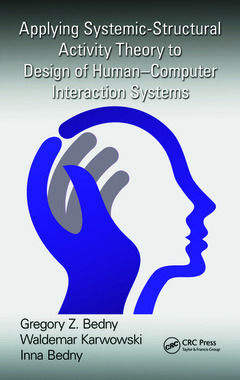Applying Systemic-Structural Activity Theory to Design of Human-Computer Interaction Systems Ergonomics Design & Mgmt. Theory & Applications Series
Auteurs : Bedny Gregory Z., Karwowski Waldemar, Bedny Inna

Human?Computer Interaction (HCI) is an interdisciplinary field that has gained recognition as an important field in ergonomics. HCI draws on ideas and theoretical concepts from computer science, psychology, industrial design, and other fields. Human?Computer Interaction is no longer limited to trained software users. Today people interact with various devices such as mobile phones, tablets, and laptops. How can you make such interaction user friendly, even when user proficiency levels vary? This book explores methods for assessing the psychological complexity of computer-based tasks. It also presents methods of qualitative and quantitative analysis of exploratory activity during interaction with a computer.
The Concept of Self-Regulation Outside of Activity Theory. Concepts of Self-Regulation in Activity Theory from Psychophysiological and Psychophysics Perspectives. Concept of Self-Regulation in Systemic-Structural Activity Theory and Strategies of Task Performance. Thinking as a Self-Regulative System and Task Analysis. Attention as a Self-Regulative System. Cognitive and Behavioral Actions as Basic Units of Activity Analysis. Morphological Analysis of Activity During Performance of HCI Tasks. Quantitative Assessment of Task Complexity Computer Based Tasks. Complexity Evaluation: Practical Example. Introduction To Human Reliability Assessment. A Systemic-Structural Activity Approach to Reliability Assessment of Computer Based Tasks. Formalized and Quantitative Analysis of Exploratory Activity in HCI Tasks.
Gregory Bedny presently resides in Wayne, NJ. He works as a Research Associate at Evolute, Inc. in Louisville, Kentucky. He is an American citizen who emigrated from the former Soviet where he earned his Doctorate Degree (PhD) in Industrial Organizational Psychology from the Educational University of Moscow and a Post-Doctorate Degree (ScD) in Experimental Psychology from the Institute of General and Educational Psychology, National Pedagogical Academy of Science of USSR. He also is Academician of the International Academy of Human Problems in Aviation and Astronautics in Russia and Honorary Doctorate in Science, Ukrainian State University. For his achievements in psychology he has been awarded the Medal of the Ukrainian National Academy of Pedagogical Sciences. He is the author of five original scholarly books, the latest of which were published in USA. The first one was co-authors with Dr David Meister in the US in 1997. This book published by Lawrence Erlbaum Associates, Inc. The second book was co-authored with Dr. Karwowski in the US in 2007. This book published by Taylor and Francis Group. He also is the co-editor of two books published by Taylor and Francis Group in 2008 and 2011. He was invited editor of journal Theoretical Issues in Ergonomics Science, V-5, #3, 2004. In former Soviet Union he worked as Industrial Engineer of Food Processing Machinery Factory, Industrial Psychologist in Industrial Research and Consulting Institute. After receiving his doctorate degrees he worked as associate and then full professor in Construction Engineering State University, in Marines Postgraduate School (part time), Pedagogical University in Odessa, Ukraine. He is author of different textbooks for universities in former Soviet Union. Dr Bedny has been conducting research on general and systemic-structural activity theory for the past 25 years. Systemic-structural activity theory is high level generality theory from which derived unified and standardize m
Date de parution : 12-2014
15.6x23.4 cm
Date de parution : 02-2024
15.6x23.4 cm
Thèmes d’Applying Systemic-Structural Activity Theory to Design... :
Mots-clés :
Simultaneous Perceptual Actions; Sensory Perceptual Level; HCI and man–machine systems; Vice Versa; Human-Computer Interaction; Algorithmic Description; PSYCHOLOGY AND ERGONOMICS; Task Performance; man–machine and HCI systems; Execution Time; optimization of human performance; Task Complexity Evaluation; systemic-structural activity theories; Computer Based Task Performance; systemic-structural activity theory; Activity Selfregulation; Function Block; SSAT; Sensory Perceptual Analysis; Eye Movement Registration; Selfregulative System; Afferent Synthesis; Dynamic Mental Model; Simple Motor Action; HCI Task; Human Algorithm; Green Button; Logical Condition; Eye Movement; Eye Movement Data; Hand Rt; Successive Perceptual Actions
